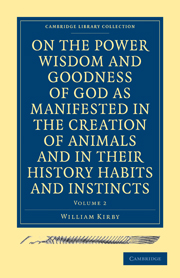Book contents
- Frontmatter
- Contents
- EXPLANATION OF PLATES
- CHAP. XIII Functions and Instincts. Cirripedes and Crinoïdeans
- CHAP. XIV Functions and Instincts. Entomostracan Condylopes
- CHAP. XV Functions and Instincts. Crustacean Condylopes
- CHAP. XVI Functions and Instincts. Myriapod Condylopes
- CHAP. XVII Motive, locomotive and prehensory organs
- CHAP. XVIII Instinct in general
- CHAP. XIX Functions and Instincts. Arachnidans, Pseudarachnidans, and Acaridan Condylopes
- CHAP. XX Functions and Instincts. Insect Condylopes
- CHAP. XXI Functions and Instincts. Fishes
- CHAP. XXII Functions and Instincts. Reptiles
- CHAP. XXIII Functions and Instincts. Birds
- CHAP. XXIV Functions and Instincts. Mammalians
- CHAP. XXV Functions and Instincts. Man
- CONCLUSION
- Index
- Plate section
CHAP. XVII - Motive, locomotive and prehensory organs
Published online by Cambridge University Press: 29 August 2010
- Frontmatter
- Contents
- EXPLANATION OF PLATES
- CHAP. XIII Functions and Instincts. Cirripedes and Crinoïdeans
- CHAP. XIV Functions and Instincts. Entomostracan Condylopes
- CHAP. XV Functions and Instincts. Crustacean Condylopes
- CHAP. XVI Functions and Instincts. Myriapod Condylopes
- CHAP. XVII Motive, locomotive and prehensory organs
- CHAP. XVIII Instinct in general
- CHAP. XIX Functions and Instincts. Arachnidans, Pseudarachnidans, and Acaridan Condylopes
- CHAP. XX Functions and Instincts. Insect Condylopes
- CHAP. XXI Functions and Instincts. Fishes
- CHAP. XXII Functions and Instincts. Reptiles
- CHAP. XXIII Functions and Instincts. Birds
- CHAP. XXIV Functions and Instincts. Mammalians
- CHAP. XXV Functions and Instincts. Man
- CONCLUSION
- Index
- Plate section
Summary
The remarkable circumstances noticed in the last chapter with regard to the legs of Crustaceans and Myriapods, and their employment in aid of manducation, sheds no small light upon the subject of locomotive organs in general, and their primary function; it will therefore not be out of place, if, in the present chapter, I consider those organs, as far as they are external, according to their several types, as exhibited in the entire sphere of animals; upon which, indeed, the due accomplishment of their various functions, and the exercise of their several instincts—which in most of the succeeding classes assume a new and more developed character—mainly depend. This is a wide field, but one full of interest, and which, studied as it deserves, conspicuously illustrates the higher attributes of the Deity.
We are placed in a world full of motion; of all motions, none fall more immediately under our notice than those of the various members of the animal kingdom; and the external organs by which they are effected, attract every eye both by their infinite diversity, and the adaptation of their individual structure to the occasions and wants of the animal in whom they are found, so that they may, in the best and safest manner, effect such changes of place as are necessary for their purposes.
Nutrition may be stated as the primary object of the motions and locomotions of the members of the animal kingdom in general.
- Type
- Chapter
- Information
- On the Power, Wisdom and Goodness of God as Manifested in the Creation of Animals and in their History, Habits and Instincts , pp. 92 - 220Publisher: Cambridge University PressPrint publication year: 2009First published in: 1835



